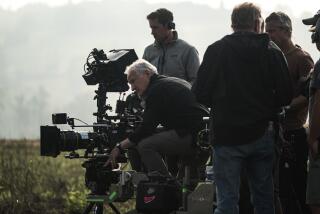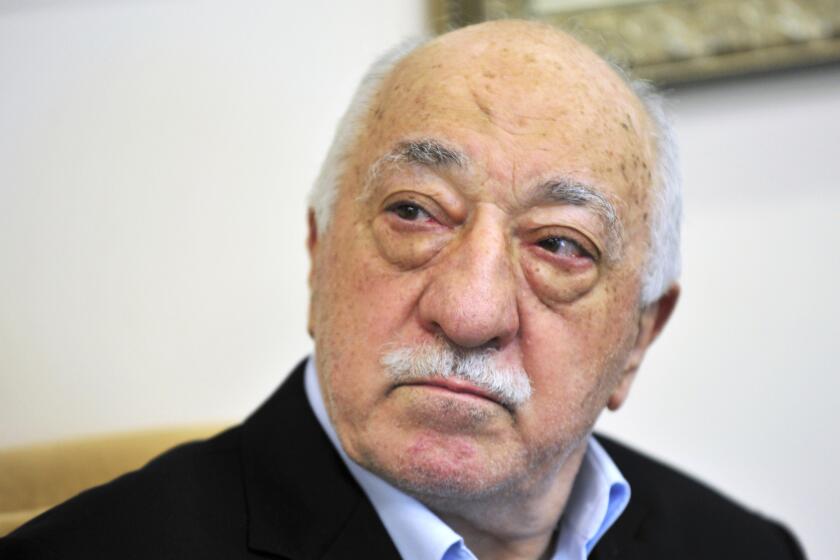Roderick Mann dies at 87; former Times showbiz columnist
Roderick Mann, a British-born show business writer who interviewed many of the world’s biggest stars during a more than 40-year career that included serving as an entertainment columnist for the Los Angeles Times, died early Friday morning. He was 87.
Mann, who had been battling dementia and the early stages of Alzheimer’s disease the last 14 months, died of cardiopulmonary arrest at an assisted-living facility in Studio City, said his wife, Anastasia Kostoff Mann.
In a journalism career that began in the late 1940s after he served as a Royal Air Force fighter pilot in World War II, Mann was the syndicated entertainment feature writer for London’s Daily and Sunday Express from the 1950s through the ‘80s.
He joined The Times in 1978 and remained at the paper until his retirement 10 years later. During that time, he continued to write his “Mann About Town” column for the Express Group in London.
“I knew his work in England very, very well, and I was just delighted that he could come to work at the Los Angeles Times,” Charles Champlin, The Times’ former arts editor and film critic, said Friday. “He was a damn good interviewer. He was a very engaging guy, and people opened up to him.”
Film reviewer Kevin Thomas, a former Times staff writer, recalled that Mann was “the quintessential Brit, handsome, silver-haired, polished and sophisticated — and very, very friendly.”
Many of the celebrities Mann interviewed, including Cary Grant, David Niven, Richard Burton and William Holden, became his close friends. As did Kim Novak, with whom Mann reportedly had a romance in the early ‘60s.
“Roddy was a gent,” said Stefanie Powers, who was often interviewed by Mann during her career and became a close friend of Mann and his wife. “You could never believe that he was a journalist, and I say that as one of the greatest compliments.
“There was nothing smarmy about him. He was gorgeous to look at. He was charm personified. He was a terribly bright, intelligent man who happened to be a journalist. He never printed anything that he did not corroborate with the person he was writing about.... He never, ever compromised any of the people he wrote about. Not for one minute did I think that I could not trust him implicitly.”
Said Robert Wagner, who co-starred with Powers on the TV series “Hart to Hart,” for which Mann did some writing: “He was a very fine man and a war hero who flew in the RAF and fought in the Battle of Britain.” He was also “a hero in many, many other ways, and a good friend to all who knew him.”
In his farewell column in The Times in 1988, Mann discussed his reply when someone at a cocktail party asked him what he did for a living.
Wrote Mann:
“I’m an interviewer,” I said. “I listen to people talking.”
“Doesn’t sound much like work to me,” he said.
And when you see it on the page, it doesn’t look like much, I agree. The only trick, I suppose, lies in steering the conversation in the right direction. And being interested in your subject.
That’s easy when you’re sitting with someone like Marlon Brando.
Mann went on to describe interviews with Niven, Jean Seberg, Brigitte Bardot and Cybill Shepherd, who continued to do her daily exercises, including standing on her head, as they spoke.
“Clearly, public interest in the lives and activities of celebrities is insatiable,” Mann wrote. “And the truth is, actors and actresses are more interesting, say, than nuclear plant managers and debt collectors, if only because the world they inhabit has been imbued (by us) with an aura of glamour.”
In addition to entertainment writing, Mann occasionally reported non-show-business stories, including traveling to Vietnam during the closing days of the war. Over the years, his work took him to more than 115 countries.
He also wrote four novels: “Nothing to Declare” (1957); “The Headliner” (1968); “Foreign Body” (1973), which was made into a 1986 movie; and “The Account” (1994). He had completed a fifth novel just before his illness, his wife said.
Mann was born Dec. 10, 1922, in Birmingham, England, to Scottish parents, who soon after returned to Glasgow. In his mid-teens, Mann completed his schooling in Paris and joined the RAF at the onset of World War II when he was 17.
He launched his career in journalism in Birmingham after the war and eventually moved to London, where he worked with Ian Fleming, author of the James Bond novels, at a London newspaper group.
Anastasia, Mann’s wife of 25 years, is his only immediate surviving family member.
No funeral will be held.
More to Read
Start your day right
Sign up for Essential California for the L.A. Times biggest news, features and recommendations in your inbox six days a week.
You may occasionally receive promotional content from the Los Angeles Times.








